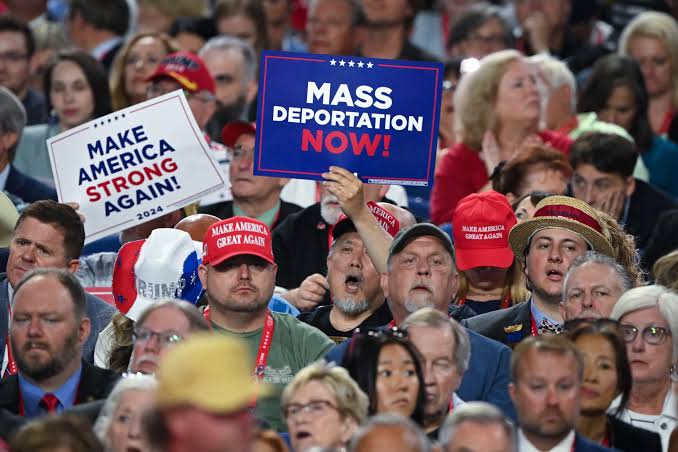Trump unveils immigration plan with mass deportations and reforms

By Tajul Islam
In a controversial announcement that underscores his hardline stance on immigration, US President-elect Donald Trump has reaffirmed his plans to implement sweeping changes to immigration policy, including ending birthright citizenship and carrying out mass deportations.
The policy proposals, unveiled during Trump’s first TV interview since his re-election, mark a return to promises made during his campaign and have already sparked intense debate across the political spectrum.
Trump’s plan involves what he describes as “the largest deportation operation in American history.” He intends to prioritize undocumented immigrants with criminal records but ultimately aims to expand deportation efforts to include all those residing in the United States without legal status.
“We have people coming here by the millions that shouldn’t be here. When they come here illegally, they’re going out,” Trump told NBC’s Meet the Press host Kristen Welker during the December 8 interview.
He emphasized that his goal is to restore order and reduce crime, which he partly attributes to illegal immigration.Critics have questioned the feasibility and ethics of such a large-scale deportation initiative.
Deporting millions of people would not only require massive resources but could also disrupt communities and local economies.
Perhaps the most contentious aspect of Trump’s immigration policy is his approach to “mixed-status” families, which include an estimated 4.7 million households in the United States.
These families typically consist of parents who are undocumented immigrants and children who are US citizens by virtue of being born in the country.
Trump proposed that such families could remain intact-by being deported together. “I don’t want to be breaking up families. So the only way you don’t break up the family is you keep them together, and you have to send them all back,” Trump stated.
He added that family members with legal status would have the option to stay in the United States but would have to separate from their undocumented relatives if they chose to do so.
The proposal has drawn backlash from immigrant advocacy groups and legal experts, who argue that deporting American citizens, even if they are children, raises serious constitutional concerns.
It also poses logistical challenges, as deportation would involve coordination with countries of origin, some of which may refuse to accept large numbers of returnees.
Another key element of Trump’s immigration agenda is his plan to end birthright citizenship. Guaranteed under the 14th Amendment of the US Constitution, this policy ensures that anyone born on US soil automatically becomes a citizen.
Trump has long criticized this practice, describing it as a “magnet” for illegal immigration.“We have to end it. It’s ridiculous,” Trump said during the interview.
He suggested that he could bypass the constitutional amendment process and enact the change via executive action. However, such a move would almost certainly trigger legal challenges, with constitutional scholars arguing that the president does not have the authority to unilaterally alter a constitutional guarantee.
Trump’s transition team is reportedly exploring various legal pathways to achieve this goal, but the effort is likely to result in an expanded court battle that could reach the Supreme Court.Despite his hardline rhetoric, Trump signaled a more conciliatory approach to the so-called “Dreamers”-undocumented immigrants who were brought to the United States as children.
While he did not provide specific details, Trump pledged to work with lawmakers to create a pathway for Dreamers to remain in the country legally.This stance represents a notable shift from his broader deportation policies and could be an attempt to garner bipartisan support on immigration reform.
However, immigrant advocacy groups remain skeptical, citing Trump’s previous efforts to dismantle protections for Dreamers under the Deferred Action for Childhood Arrivals (DACA) program.
Trump’s commitment to stricter immigration enforcement is further reflected in his Cabinet picks. Kristi Noem, the incoming Secretary of Homeland Security, and Tom Homan, Trump’s new “border czar,” are both known for their tough stances on border control and immigration.
Noem, the current governor of South Dakota, has been a vocal supporter of Trump’s border wall and has advocated for aggressive measures to deter illegal immigration.
Homan, a former acting director of Immigration and Customs Enforcement (ICE), has a history of defending hardline enforcement tactics, including workplace raids and family detention policies.
The duo is expected to work closely to implement Trump’s immigration agenda, including ramping up border security and increasing deportation efforts.
Trump has described their appointments as key to achieving his goal of making America “safe again.”Trump’s proposed policies have drawn sharp criticism from Democrats, immigrant advocacy groups, and some legal experts.
They argue that the plans are not only inhumane but also legally questionable.“Deporting entire families, including US citizens, is not only unconstitutional but also morally reprehensible,” said Marielena Hincapié, executive director of the National Immigration Law Center.
“This approach undermines our nation’s values and will have devastating consequences for millions of people.”On the other hand, Trump’s supporters view his proposals as a necessary step to address what they see as decades of lax enforcement.
Conservative groups have praised Trump’s determination to end birthright citizenship and secure the border, arguing that these measures are essential for national security and economic stability.
“Americans are tired of watching their communities and resources strained by illegal immigration,” said Mark Krikorian, executive director of the Center for Immigration Studies. “President Trump is fulfilling his promise to put Americans first.”
While Trump’s proposals have energized his base, they are likely to face significant legal and political obstacles. Ending birthright citizenship through executive action would provoke immediate constitutional challenges, while mass deportations could strain federal resources and ignite widespread protests.
Moreover, Trump’s immigration agenda is expected to be a major flashpoint in Congress, where Democrats and moderate Republicans may push back against the most controversial aspects of his plan.
Donald Trump’s immigration policies represent some of the most ambitious and polarizing proposals in modern American history.
By targeting mixed-status families, ending birthright citizenship, and ramping up deportations, Trump is doubling down on the hardline promises that helped secure his re-election.
However, the path to implementing these policies is fraught with legal, logistical, and political challenges.
As Trump prepares to take office, the nation is bracing for a heated debate over the future of immigration in America-and the fundamental values that define the country.




